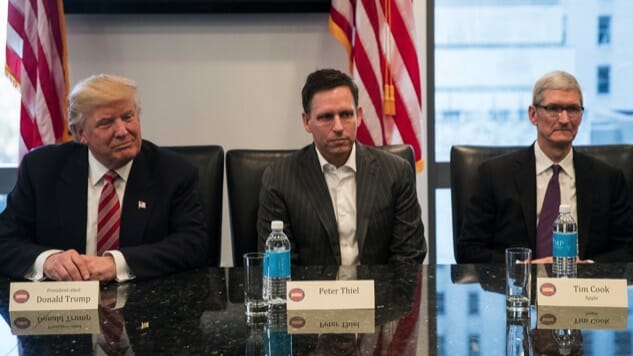Survival of the Richest: The 1%’s Priorities with Environmental Crises
Photo by Drew Angerer
For as long as wealth inequality has existed, the wealthy have sought to use their financial privilege to hedge against existential threats. Often, these have been costly but spiritual precautions, from pharaohs constructing opulent tombs ensuring a continued luxuriation in the afterlife to medieval nobility purchasing indulgences to atone for their sins in the Earthly realm. Rulers have had plenty of materialist concerns as well, of course. Look at a palace from any number of civilizations throughout history. They tend to be a little sturdier than the dwellings of the ruler’s subjects (not to mention impenetrable to those same subjects).
Andy Warhol once observed, “You can be watching TV and see Coca-Cola, and you know that the President drinks Coke, Liz Taylor drinks Coke, and just think, you can drink Coke, too. A Coke is a Coke and no amount of money can get you a better Coke than the one the bum on the corner is drinking. All the Cokes are the same and all the Cokes are good.” As with Coke, the bourgeoisie shares certain anxieties with the proletariat. While the 1% has unique concerns of its own—spiritually, its hoarding of wealth runs afoul of nearly every religion; materially, popular uprisings tend to target the ruling class—it shares a dread for the network of looming environmental crises set to devastate humanity. And it hates that.
This class of people has the greatest potential to thwart climate change—not to mention disproportionate culpability for it—but rather than use its obscene wealth to try to save humanity from apocalypse, the increasingly eschatological upper class is funneling its resources into doomsday preparation for themselves. No longer can we argue that climate change is accelerating because the bourgeoisie doesn’t really believe in climate change. It’s accelerating because it does.
Belief that human activity is contributing to climate change is increasingly widespread in America and around the world. This broad acceptance is mostly a positive development, but it has two profoundly dangerous ramifications.
First, the idea that humanity could be done in by anthropogenic acceleration of climate change goes against most notions of a benevolent god. Thus, acceptance of these circumstances necessitates the abandonment or at least modification of certain theistic frameworks of morality. So while religiosity is not a proxy for morality, it’s probably no surprise increased awareness of the climate change threat has changed the ethical calculus for some. Without even bringing religion into it, increased likelihood that the human species could die out in a geological instant shifts priorities about anything beyond our own lifetimes. It’s not a far leap to nihilism from there.
Second, the capacity for humans to modify systems as massive and complex as the climate of the Earth challenges many definitions of the parameters of human power, religious and otherwise. It means that, as a species, we are far more impactful than we had imagined for most of human history, and so it’s natural to assume that individual people are thus more impactful than once thought. Individuals gain power as religion cedes it, and those people begin to occupy that vacuum. Savior complexes are as common in Silicon Valley as Soylent Diarrhea or whatever condition makes you need to wear hoodies all the damn time, and tech mavens like Gates and Zuckerberg enjoy worshipful press coverage about their pledges to save the world from menaces like school and advertisements that aren’t invasive enough. Today’s wealthiest people are seen as godly in their dominion over humanity.
Aside from maybe nuclear holocaust, the annihilations presaged by religious texts are about the only parallel for the fearsomeness the threat of climate change imposes. So it’s a natural fit for this new pantheon. Rather than praying to gods to protect us from imminent doom, we pray to the disruptors, the thought leaders, the digital prophets. Where God and government fell short, we call to the technologists.
But these tech demigods are not heeding our prayers. The people most empowered to provide our salvation seem more interested in making sure their private heaven is just right before addressing our concerns here on Earth.
Through most of human history, people could often find a sense of safety by just going somewhere else. Exploration and colonization are always born from a sense of insecurity. New worlds offer new resources to consume, new peoples to exploit or destroy, new havens to escape to. Wilderness has served different roles for us over time, but as historian William Cronon writes in “The Trouble with Wilderness; or, Getting Back to the Wrong Nature,” once Earth’s frontiers had been conquered, the bourgeois class looked to the natural world for salvation:
“For many Americans wilderness stands as the last remaining place where civilization, that all too human disease, has not fully infected the earth. It is an island in the polluted sea of urban-industrial modernity, the one place we can turn for escape from our own too-muchness. Seen in this way, wilderness presents itself as the best antidote to our human selves, a refuge we must somehow recover if we hope to save the planet. . . . Thus the decades following the Civil War saw more and more of the nation’s wealthiest citizens seeking out wilderness for themselves. The elite passion for wild land took many forms: enormous estates in the Adirondacks and elsewhere (disingenuously called “camps” despite their many servants and amenities), cattle ranches for would-be rough riders on the Great Plains, guided big-game hunting trips in the Rockies, and luxurious resort hotels wherever railroads pushed their way into sublime landscapes.”
Of course, this phenomenon persists today, in a feedback loop wherein commodification of the natural world necessitates its preservation, which makes commodification that much more tempting. At the extremes, Silicon Valley billionaires like Trump chum and comic book supervillain Peter Thiel are conglomerating their own pieces of wilderness as last resorts. With fewer virginal tracts to grab, “seasteading” projects—building habitable islands from scratch at sea, apart from any country’s territory—have gained steam (though Thiel himself, once a proponent of the idea, has cooled his enthusiasm).
Other tech billionaires have sought to “disrupt” the concept of wilderness even more aggressively. At least a couple of them are investing in research focused on “breaking us out of the simulation,” based on a theory that the reality we experience is a mere simulation of the real world. Tesla and SpaceX CEO Elon Musk is working on getting to Mars (and you can come too, for an estimated ticket price of $10 billion). The less ambitious among them still see potential disasters ahead, but those not trying to escape are still interested more in surviving a disaster than in preventing one. In The New Yorker, Evan Osnos catalogs the myriad ways this class of people is hedging against an apocalyptic event with “the guns and the motorcycles and the gold coins,” including an investment banker who built himself an underground bunker with an air-filtration system and keeps a helicopter gassed up for a quick departure at all times.
On their own, none of these individual behaviors would necessarily be alarming, or at least no more peculiar than the paranoid eccentricities of, say, Howard Hughes or John du Pont. Taken together, though, against a backdrop of global warming and mass extinction, they paint a clear picture: the people we have elected as gods, even those who have embraced the role of savior, have put their own safety ahead of the welfare of their subjects.
It’s unclear how much of this doomsday preparation comes from certainty as opposed to a “just in case” mentality. There’s a good chance they’re onto something either way. To the extent that they control most of the world’s wealth, it kind of doesn’t matter whether they’re any good at predicting the future: they shape it. Their spending power and objects of worry combine into a self-fulfilling prophecy. That they’re rich doesn’t mean they know what’s coming; that they’re rich means they can make it come. If they believe the world is ending and spend their money to muscle through it (instead of trying to prevent that from happening or even on looking past it), the world as we know it will end. Full stop.
There are three ways to respond to this (no combination of which is mutually exclusive):
Talk them out of it. Convince them that, while we are approaching it rapidly, we are not yet past the point of no return on climate change. Full bore efforts could stave off at least the most fatalistic predictions. As a rhetorical challenge, this seems like most achievable goal to pursue, but there’s a problem with this approach: many scientists do believe we’re already past that point. Whether or not this method could be effective in altering behavior is secondary to whether that behavior is worth anything at all at this point.
Remove their influence. Of all the reasons that our massive wealth inequality is problematic, climate change represents perhaps the gravest threat. Wealth inequality, in a very real sense, could lead to the annihilation of most of humanity in a short span of time. If eating the rich is not an option (and the measures they’re taking to insulate against natural disaster will likely serve doubly as a bulwark against unruly mobs), then other radical means of income distribution must be taken. After all, the risks hastened by their disproportionate consumption are socialized across the planet. In fact, the costs of climate change disproportionately burden the global poor along virtually all environmental justice vectors. It’s more than fair to have the wealthiest among us bear a greater proportion of the mitigation of the risks.
Follow their lead. What if they’re right, and humanity really is doomed? Is it better to spend our waning years futilely resisting an unstoppable force in some cosmically overlooked performance of dignity? Or should we take the “If you had exactly one year to live” thought experiment to its global extreme? No more saving for the future or creating lasting works or giving a hoot about the next generation or our own legacies. Live in the now, because there probably won’t be a then.
The path forward is not clear. If a path exists at all, it will require greater selflessness from those who have spent their lives acting in their own best interests—and being rewarded handsomely for doing so.







































